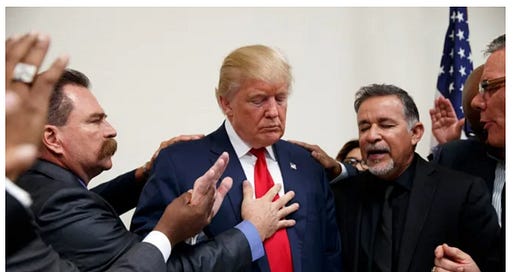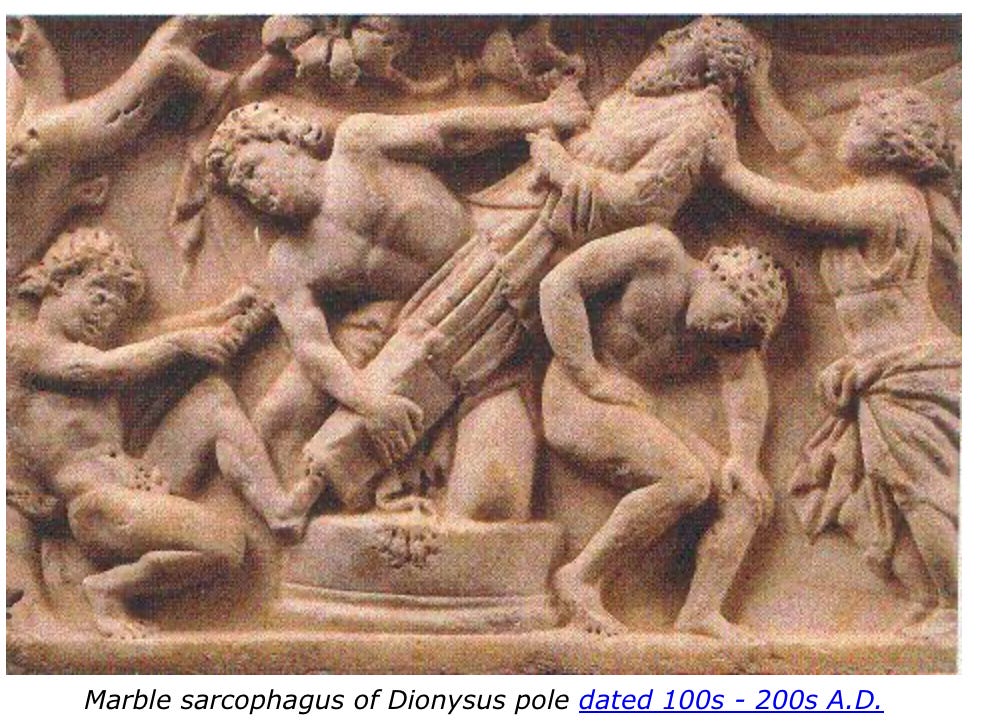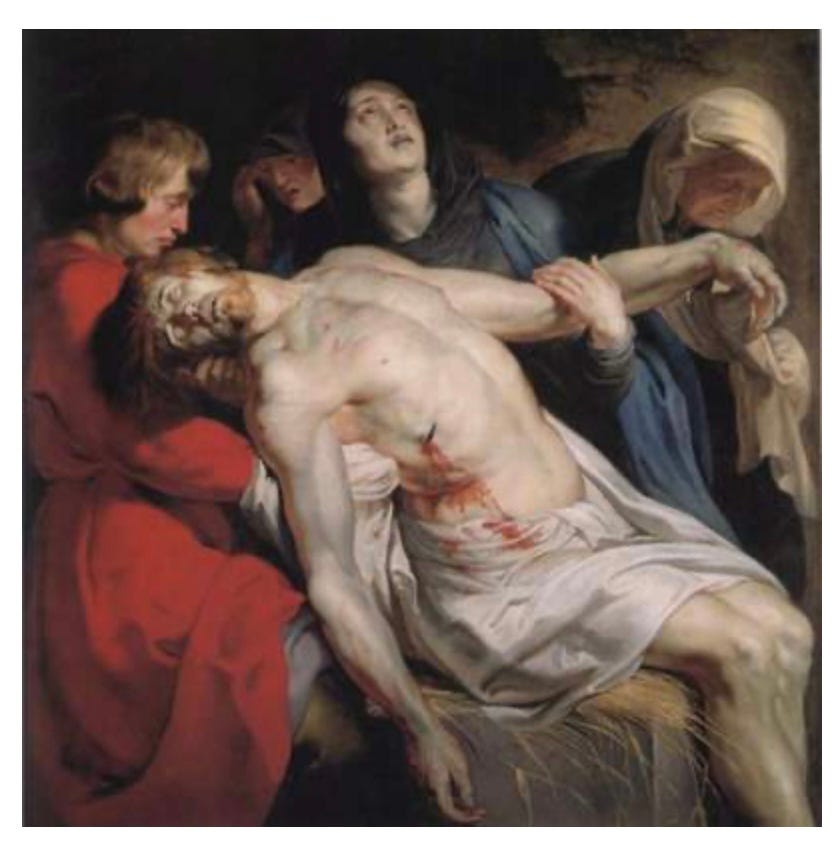How Trump Became a God for Evangelicals
It wasn’t abortion. It was a bunch of indictments. And maybe the power of myth.
I’m going to try out an idea with you. It’s about Trump and the evangelicals—maybe the weirdest alliance American politics has spawned. It’s kind of staggering, mind-spinning, brain-scrambling, and sort of nightmarish. And worth a little more imaginative reflection than provided by Steve Kornacki’s Big Board dissection of demography.
So here goes:
Yesterday in Iowa it became conclusive: Donald Trump—of all people—has evangelical Christians in his pocket. In 2016, religious Republicans scorned him in favor of Ted Cruz, who won the Iowa caucus (as had Rick Santorum in 2012 and Mike Huckabee in 2008.) Last night, Trump won 58% of the vote in the most religious counties, and evangelicals were his biggest supporters:
[In 2016] The northwest quadrant of the state was Cruz’s strongest and Trump’s weakest. This year, Trump won some of his best results there, matching the much less evangelical region in the northeast. Overall, Trump improved by 35 percentage points in the most evangelical counties, one of his biggest gains. For example, in small Hancock County in the northern tier of the state, which has one of the highest share of evangelical voters, Trump got 19 percent of the vote in 2016. He won 65 percent Monday night.1
What’s staggering/nightmarish is that not only did evangelicals vote for him, but in interviews before and at the caucus sites, they’ve spoken of Trump being God’s choice, compared him to David fighting Goliath, and described him as a martyr. Paul Figie, a pastor and a Trump caucus captain, declared Trump to be “ordained by God,” and is convinced that God himself will see to it that Trump gets back in office. “Trump is the guy to be in there, and amen.”
Trump, of course, never missing an opportunity no matter how cynically, has accused the Biden administration of discriminating against people of faith: “Christians and Americans of faith are being persecuted and government has been weaponized against religion like never before.” ( He does love that phrase.) He’s unabashedly peppered his own speeches with biblical comparisons and language. It reached a peak over the past week with a viral video, first posted to Truth Social and then played at rallies over the weekend, called “God Made Trump”(visual: baby Trump), describing Trump as the “vessel of a higher power sent to save the nation.”:
“God looked down on his planned paradise and said, ‘I need a caretaker,’ so God gave us Trump,” begins the video, which appears to use artificial intelligence to mimic the voice of Paul Harvey, a conservative radio broadcaster who died in 2009. Mr. Trump, it adds, “is a shepherd to mankind who won’t ever leave nor forsake them.”
I’m not even going to go searching for that video. If you want to see it, you can do that yourself.
Judging by past evangelical priorities, we would have expected DeSantis, not Trump, to be the evangelical’s favorite. While Trump avoided and equivocated, DeSantis was clear on how he stood with respect to abortion and LGBTQ+ rights. He and his wife, Casey DeSantis courted evangelicals non-stop prior to the caucus, visiting Sunday church services, where he touted his six-week abortion ban and war against “woke” in classrooms and libraries and won the endorsement of Iowa evangelical leader Bob Vander Plaats, head of the Family Leader.
And do I even need to list all the biblical sins that Donald has committed?
The fact that Trump, not DeSantis, has become the Chosen One for evangelicals shows that although it’s been their brand in the past, they don’t actually care about Family Values, or the Ten Commandments, or even much about abortion or homosexuality. (DeSantis actually won nearly half of the voters who said abortion was their most important issue. That’s compared with 25 percent for Trump, who bragged that he appointed the justices who overturned Roe v. Wade. So much for the evangelical devotion to the fetus’s “right to life”)
So what do they care about?
They certainly don’t care (along with the rest of the Republican Party) about his indictments—91 criminal charges across four indictments, including allegations involving paying hush money to an adult-film star and trying to overturn the 2020 election—except insofar as are evidence of political persecution. In fact, the indictments reversed the downward trend that Trump was on before them. As recently as July—that really wasn’t so long ago, although seems like another era—Trump’s popularity was in steady decline Remember? People weren’t even interested in his tweets on Truth Social. But then the indictments against him began to pile up, and with them the conspiracy theories. According to many pundits, that’s what brought Republicans “rallying around him,” “coming home” to him, etc.
What the pundits haven’t recognized, though, is that to a religious imagination, “persecution” may resonate differently than it does to a secular mind. To a non-evangelical Republican, Trump’s indictments turned him into a victim of Biden’s justice department and various “weaponized” courts—that is, Trump as target of a politically motivated attack.
But to an evangelical, perhaps, it also started to seem a little like…martyrdom. And with that resonance a powerful archetypal mythology may have been activated.
In George Frazer’s The Golden Bough (1890) it’s described as the mythology of the dying and resurrected god, and was connected to the rebirth of spring out of winter, fertility out of barrenness. Frazer finds versions of it in numerous religions, both Eastern and Western. For us, perhaps the most familiar examples are Dionysus and Jesus Christ. You all know about the crucifixion and resurrection of Christ. Probably most of you know the story of Dionysus, too. But for those who don’t: Dionysus, the son of Zeus, figures variously in different versions of the (originally, Greek) myth but always represents the embrace of life in some way (wine, dance, sexuality, abandon, etc.)2 Torn to pieces and boiled and eaten by Titans (more color, there, than Jesus’s crucifixion), he was then “resurrected” from his uneaten heart and a few other discarded parts by Dionysus’s grandmother Rhea. (As for the Titans, Dionysus’s father Zeus sent his famous thunderbolts down to destroy them and formed human beings from their ashes.)
Frazer’s version of the dying and resurrected god has been challenged as too universalizing in its particulars (e.g. Frazer saw resurrection as always analogous with cycles of vegetation, which is isn’t in all cultures, and probably wasn’t for those who first circulated the story of Christ’s ressurection.3) But the central notion—the enduring imagination of rebirth (not afterlife, which is a different notion) following the dying of a former self, enacted by a god-like figure in various myths—has been adopted by many thinkers, most famously the Swiss psychoanalyst Carl Jung, who argued that death and resurrection were part of the "trans-personal symbolism" of a collective unconscious shared by all cultures. For Jung, pagan gods like Dionysus foreshadowed Christ’s physical death and resurrection—an idea many evangelicals would find repugnant, as it allows for the possibility that the resurrection, as in the Greek reassembling of Dionysus, was symbolic rather than actual. They might find less repugnant, the original Jewish version of the resurrection, within which the messiah plays a political/priestly role (not an agricultural one) to drive out the forces of evil from the world. (See footnote 2) And Trump himself would certainly be delighted by the version of Dionysus that describes him as “with balls.” (See footnote 1)
So there is Trump, tall and golden-haired, a shaft of light bathing his head even in the photo his captors take (must be God’s work even there!), persecuted—as Jesus was—by the state, being torn apart, indictment by indictment, by the Titans of the Biden administration, headed for martyrdom. Could anything be clearer?
But God has a different plan for his Chosen One. Working His Mysterious Ways through those most devoted to Him—the evangelical Christians—he will be resurrected….and the True Kingdom of the righteous will be restored.
What does that Kingdom look like? It’s White America of course, cleansed of the “vermin” of the immigrants, the Blacks and the Browns, the invading armies of the not-Real Americans. It was taken away from its rightful owners by a generation or two that lost its way. But under Trump’s stewardship, the “Libs” and other pretenders will be vanquished and God’s plan for America can be restored again.
If evangelicals do see Trump as a persecuted and about-to-be-resurrected god (or son of God), whether literally or via archetypal stirrings, then it’s clear Nikky Haley and Ron DeSantis have done themselves no good whatsoever by not calling him out as the criminal that he is. By being cowardly, they’ve allowed his star to rise unimpeded over the evangelical kingdom. They’d have done better to challenge him forcefully, focusing in particular on the perversity of turning such a blatant sinner into a messiah/martyr. Maybe it wouldn’t have made any difference. But at least the absurdity would have been out there.
Instead, as Barry Hankins, history professor and expert in evangelicalism has said, “many evangelicals are welcoming authoritarianism and courting blasphemy” by welcoming “Trump as their champion and defender — perhaps even savior.”
And the most terrifying upside-down of it all is that the closer Trump gets to paying for his crimes in court—something many of us fervently wish for—the more of a martyr he will become in the eyes of those seduced, bedazzled and befuddled by the prospect of their battered savior “rising” again.
Addendum, July 15, 2024:
Since this piece was written, Trump has, without shame, indulged in many comparisons with Christ. During a speech at the “Faith and Freedom Coalition,” he threatened to take off his shirt to display not just his “beauty” but the wounds that he has suffered as God’s warrior.
“Together, we stood up to the communists, Marxists and fascists to defend religious liberty like no other president has ever done. And I have the wounds all over my body. If I took this shirt off you’d see a beautiful, beautiful person but you’d see wounds all over me. I’ve taken a lot of wounds, I can tell you. More than I suspect any president ever.”
And now, this past week-end, a would-be assassin delivered an actual wound to Trump. The injury to Trump himself was minor, but one supporter was killed and two others, as of my writing this addendum, remain hospitalized. Despite those tragedies, Trump was quick to declare, in a tweet, that “God prevented the unthinkable from happening.” The religious symbolism, including scenes of a bloody Trump being carried from the podium, will undoubtedly be exploited in future appearances.
https://www.washingtonpost.com/elections/2024/01/14/trump-evangelicals-iowa/
Condensed from Wikipedia: Dionysus sometimes has the epithet Acratophorus', by which he was designated as the giver of unmixed wine, and worshipped at Phigaleiain Arcadia.[5][6] As Bacchus, he carried the Latin epithet Adoneus', "Ruler".[8]Aegobolus, "goat killer", was the name under which he was worshiped at Potniae in Boeotia.[9] Another epithet was Bromios, "the thunderer" or "he of the loud shout". As Dendrites, "he of the trees", he is a powerful fertility god. Eleutherios ("the liberator") was an epithet for both Dionysus and Eros. Other forms of the god as that of fertility include the epithet in Samos and Lesbos Enorches' ("with balls"[10] or perhaps "in the testicles" in reference to Zeus' sewing the infant Dionysus into his thigh, i.e., his testicles).[11] With the epithet Liknites ("he of the winnowing fan"), he is a fertility god connected with the mystery religions In addition, Dionysus is known as Lyaeus ("he who unties") as a god of relaxation and freedom from worry and as Oeneus, he is the god of the wine.
Bordo note: I suspect Trump would especially go for the “with balls” variant.
Arthur George: “Jewish literature shows that the Messiah was supposed to be a powerful figure who would play a political and/or priestly (never agricultural) role, principally to drive out the forces of evil from the land and restore the kingdom of Israel. According to Jesus’s own apocalyptic teachings, God would soon intervene in human history to establish the Kingdom of God on earth (Ehrman 1999). His followers among whom the Resurrection story originated embraced this belief, as also evidenced by the fact that the earliest Christian communities were apocalyptic communities (Ehrman 1999, p. 139). Agricultural cycles and associated gods were simply not on their radar screens, because the world was about to come to an end anyway! In the Kingdom of God there would be no hunger, so agricultural fertility would not be a concern.”








I have thought a lot about this issue. And the counter might be, should one choose to challenge them, that God sent sinner Trump...but not as savior. He sent an obvious criminal, cheater, liar, sex abuser, thief as a test. Who worships such evil...will answer to God, sooner than later.
Sure Jesus is up there pulling his hair out. "After all I taught and lived, to now be so distorted. To use the 'power' of my name to push perversity...if they believe, do they not think I am ignoring this? Trump is the test, and some are getting failing grade. Biggly."
Susan, this might interest you. The Deification of Donald Trump Poses Some Interesting Questions https://www.nytimes.com/2024/01/17/opinion/trump-god-evangelicals-anointed.html?unlocked_article_code=1.OU0.h-M8.9mZzZkrAmVaE&smid=nytcore-android-share